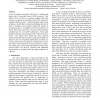Free Online Productivity Tools
i2Speak
i2Symbol
i2OCR
iTex2Img
iWeb2Print
iWeb2Shot
i2Type
iPdf2Split
iPdf2Merge
i2Bopomofo
i2Arabic
i2Style
i2Image
i2PDF
iLatex2Rtf
Sci2ools
146
click to vote
LCTRTS
1999
Springer
1999
Springer
Effective Exploitation of a Zero Overhead Loop Buffer
A Zero Overhead Loop Buffer (ZOLB) is an architectural feature that is commonly found in DSP processors. This buffer can be viewed as a compiler managed cache that contains a sequence of instructions that will be executed a specified number of times. Unlike techniques such as loop unrolling, a loop buffer is a hardware technique that can be used to minimize loop overhead without the penalty of increasing code size. In addition, a ZOLB also requires relatively little space and power, which are both important considerations for most DSP applications. This paper describes strategies for generating code to effectively use a ZOLB. The authors have found that many common improving transformations used by optimizing compilers to improve code on conventional architectures are shown (1) to allow more loops to be placed in a ZOLB and (2) to further reduce loop overhead of the loops placed in a ZOLB. The results given in this paper demonstrate that this architectural feature can often be exploi...
Related Content
| Added | 04 Aug 2010 |
| Updated | 04 Aug 2010 |
| Type | Conference |
| Year | 1999 |
| Where | LCTRTS |
| Authors | Gang-Ryung Uh, Yuhong Wang, David B. Whalley, Sanjay Jinturkar, Chris Burns, Vincent Cao |
Comments (0)

